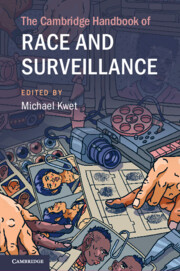Book contents
- The Cambridge Handbook of Race and Surveillance
- The Cambridge Handbook of Race and Surveillance
- Copyright page
- Contents
- Figures
- Contributors
- Acknowledgments
- 1 The Golden Age of Racial Surveillance
- 2 Sorting Identity
- 3 Imperial Mimesis
- 4 The Racialisation of British Women during the Long Nineteenth Century
- 5 Linking Caste and Surveillance
- 6 Surveillance in South Africa
- 7 Israel/Palestine, North America, and Surveillance
- 8 Colonialism’s Uneasy Legacy
- 9 China’s Surveillance and Repression in Xinjiang
- 10 Asian Americans as “the Perpetual Foreigner” under Scrutiny
- 11 The Great White Father and His Little Red Children
- 12 In a Most Excellent and Perfect Order
- 13 Surveillance and Public Schools
- 14 Surveillance and Preventing Violent Extremism
- 15 Resistance and the Politics of Surveillance and Control
- 16 Surveilled Subjects and Technologically Mediated Law Enforcement
8 - Colonialism’s Uneasy Legacy
Topologies of Race and Surveillance in São Paulo
Published online by Cambridge University Press: 23 February 2023
- The Cambridge Handbook of Race and Surveillance
- The Cambridge Handbook of Race and Surveillance
- Copyright page
- Contents
- Figures
- Contributors
- Acknowledgments
- 1 The Golden Age of Racial Surveillance
- 2 Sorting Identity
- 3 Imperial Mimesis
- 4 The Racialisation of British Women during the Long Nineteenth Century
- 5 Linking Caste and Surveillance
- 6 Surveillance in South Africa
- 7 Israel/Palestine, North America, and Surveillance
- 8 Colonialism’s Uneasy Legacy
- 9 China’s Surveillance and Repression in Xinjiang
- 10 Asian Americans as “the Perpetual Foreigner” under Scrutiny
- 11 The Great White Father and His Little Red Children
- 12 In a Most Excellent and Perfect Order
- 13 Surveillance and Public Schools
- 14 Surveillance and Preventing Violent Extremism
- 15 Resistance and the Politics of Surveillance and Control
- 16 Surveilled Subjects and Technologically Mediated Law Enforcement
Summary
Roaming around in São Paulo can be quite a stimulating experience: The city’s bustling rhythm, its effervescent cultural life, and its ethnic heterogeneity leave little room for doubt as to why Brazil’s largest city is generally considered South America’s most vibrant and cosmopolitan metropolis. Meanwhile, the city’s “tough concrete poetry”1 also bespeaks a configuration in which human bodies are dwarfed and citizens are constantly reminded of their respective place – a proverbial “city of walls”2 in which the utopia of a universally accessible and politically empowering public space has long since been thwarted by a maze of privatized streets, fortified urban enclaves, and an omnipresent array of surveillance devices. Despite the local elites’ attempts to depict São Paulo as a place which is defined by both its tolerance and its diversity,3 the city’s very material configuration thus indicates an urbanistic model which segments and separates more than it joins and unites. Rather than the clichéd melting pot, São Paulo resembles a kaleidoscope in which social class and ethnic affiliation assign each citizen a precise spatial coordinate in a cityscape defined by a mesh of internal frontiers – some brutally physical, others more subtle and ethereal – and the corresponding characteristic of an almost suffocating impermeability.
Information
- Type
- Chapter
- Information
- The Cambridge Handbook of Race and Surveillance , pp. 137 - 165Publisher: Cambridge University PressPrint publication year: 2023
Accessibility standard: Unknown
Why this information is here
This section outlines the accessibility features of this content - including support for screen readers, full keyboard navigation and high-contrast display options. This may not be relevant for you.Accessibility Information
- 1
- Cited by
